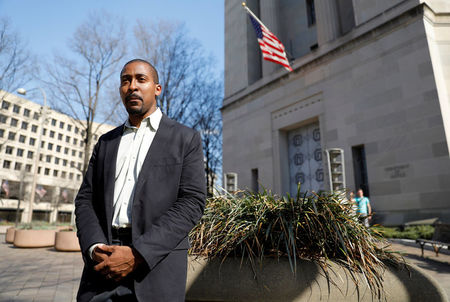By Lawrence Hurley
WASHINGTON (Reuters) - When Johnathan Smith resigned from the U.S. Justice Department on Inauguration Day, he looked forward to spending time with his infant son, but that plan unraveled a week later when President Donald Trump unveiled his explosive foreign travel ban.
Within two weeks, Smith had a new job as legal director of civil rights group Muslim Advocates and was drafting briefs for a successful court challenge to the ban, joining other former top Obama administration lawyers now fighting Trump.
It is not surprising that Smith and some of his colleagues, political appointees of Democratic President Barack Obama, would leave the Justice Department now led by Republicans. What is unusual is how fast they have signed up to be Trump adversaries.
Some Republican lawyers say they were less hasty in moving into oppositional roles post-election. George Terwilliger, a senior Justice Department official under President George H.W. Bush, described the Obama lawyers' actions as "unprecedented to my memory – and really bad form."
One reason for the Obama lawyers' quick moves, some of them said, was Trump's aggressive use of executive authority from day one, which was guaranteed to attract court challenges.
Obama faced legal fights over executive power and some of his challengers were formerly lawyers for President George W. Bush, over issues such as immigration and Obamacare. But those came later in Obama's presidency.
Besides Smith, other lawyers who have jumped into the fray include former Attorney General Eric Holder, who is advising California's legislature on challenging Trump over immigration, environmental regulations and healthcare; and former acting solicitor general Neal Katyal, who is helping Hawaii contest Trump's revised travel ban.
Influential Manhattan prosecutor Preet Bharara and another 45 Obama-era U.S. attorneys are out of jobs after the Trump administration asked them to resign on Friday.
Many of the Obama lawyers keep in touch, but reject the notion, proffered by some Republicans, that Obama is behind resistance efforts. Some of the lawyers credit their rapid transition to Trump's hardline positions on key issues and to ethical concerns about his presidency and business interests.
“There’s a unique threat to our democracy and Constitution that we see in the assault the president is mounting on the Muslim community," said Smith, who worked on religious discrimination issues at the Justice Department.
Norman Eisen, who was Obama's top ethics lawyer and later ambassador to the Czech Republic, had expected to focus on his work at a think tank after Trump's election. But instead, he said, "the ethics emergency of constitutional dimensions has galvanized me back into my initial Obama role."
Eisen is now also chairing Citizens for Responsibility and Ethics in Washington, a watchdog group he co-founded. The group has already sued Trump over alleged ethics violations.
Other Obama appointees taking on Trump include former White House lawyer Ian Bassin who has founded United to Protect Democracy, a new group probing Trump over ethics; and James Cadogan, who worked with Smith at the Justice Department, and is now at the NAACP Legal Defense and Education Fund, a civil rights group already clashing with the new administration.
Some career government lawyers, who are not political appointees and normally do not resign in power shifts, have also resigned to oppose Trump. One is Sharon McGowan, who worked on LGBT issues at the Justice Department.
On Inauguration Day, she was offered a job as director of strategy at Lambda Legal, an LGBT advocacy group. McGowan said she decided to leave Justice when Trump named Jeff Sessions, a hardline conservative Alabama senator, to be attorney general.

That was a "game-changer," she said. "I knew there would be no chance for me to preserve what I’ve been working on so hard."